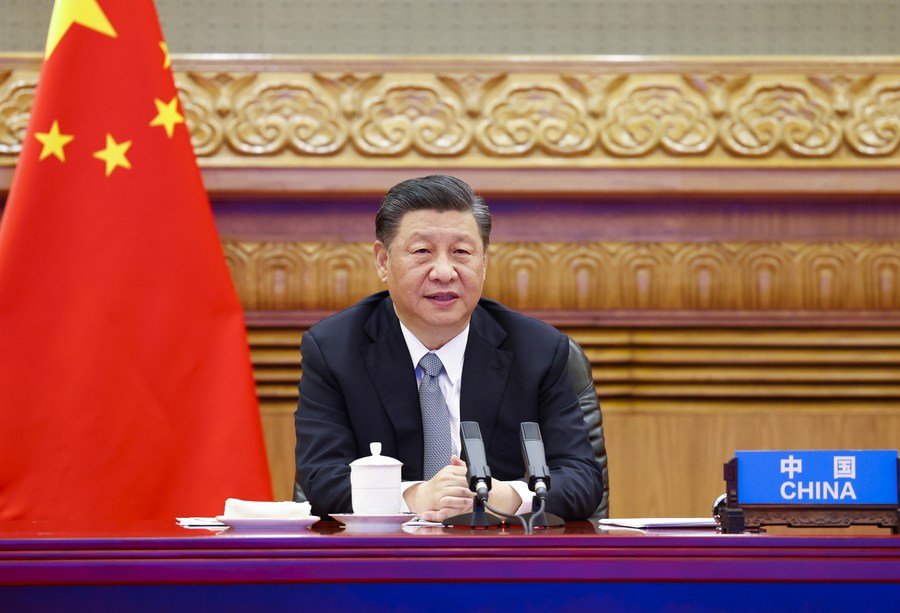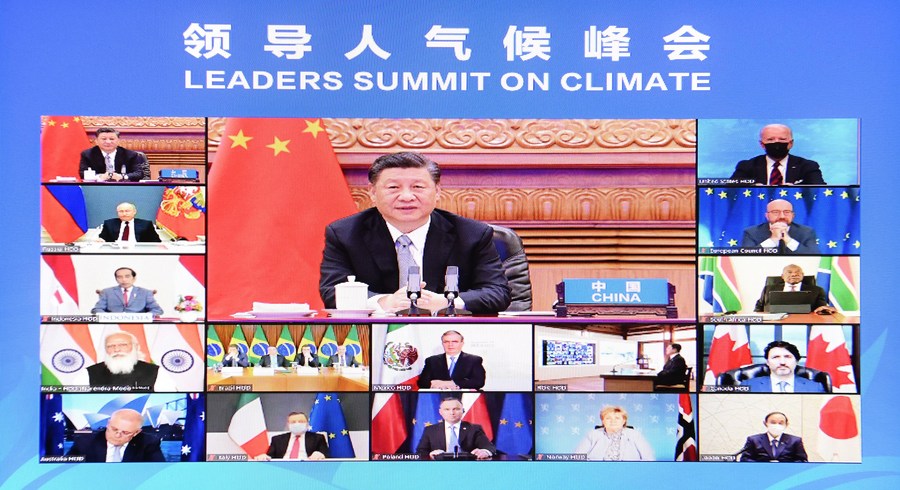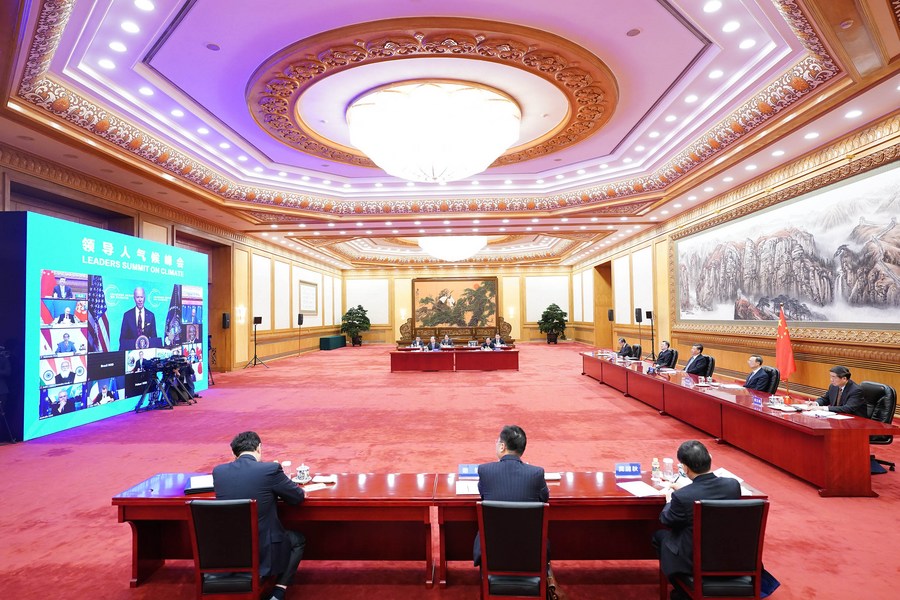
At the invitation of U.S. President Joe Biden, Chinese President Xi Jinping attends the Leaders Summit on Climate via video link and delivers an important speech titled "For Man and Nature: Building a Community of Life Together" in Beijing, capital of China, April 22, 2021. (Xinhua/Huang Jingwen)
Xi Jinping's remarks outlined "far-reaching values for global cooperation among all peoples," says Kevin Clark.
LOS ANGELES, April 24 (Xinhua) -- Chinese President Xi Jinping's appeal for fostering a community of life for man and nature boasted far-reaching wisdom and values, scholars at U.S.-based think tanks have said.
"It is important that we have shared values for the globe to embrace nature and develop an ecological civilization," said Dr. Bruce Hanson, a researcher at the California-based Institute for Postmodern Development of China (IPDC) while recalling Xi's speech at the virtual Leaders Summit on Climate made via video link on Thursday.
To build a community of life for man and nature, Xi made a six-pronged proposal as to what the international community must be committed to -- from harmony between man and nature, green development, systemic governance, a people-centered approach, to multilateralism and the principle of common but differentiated responsibilities.
Discussing what we mean by harmony, productivity, systemic governance, well-being and other core values is a key to common understanding of climate change, Hanson told Xinhua in an interview on Friday, noting that he appreciates the values and initiatives presented in the speech.
"The Chinese civilization has always valued harmony between man and Nature as well as observance of the laws of Nature. It has been our constant pursuit that man and Nature could live in harmony with each other," he quoted Xi as saying.
It is "very encouraging" to hear what the leader of the most dynamic economy of the world has to say, said Hanson, noting that Xi's appeal also embodies the nation's ancient wisdom.
The IPDC advocates global pathways to ecological civilization through new modes of development, according to its website.

At the invitation of U.S. President Joe Biden, Chinese President Xi Jinping attends the Leaders Summit on Climate via video link and delivers an important speech titled "For Man and Nature: Building a Community of Life Together" in Beijing, capital of China, April 22, 2021. (Xinhua/Li Xiang)
Echoing Hanson, Kevin Clark, Director of Center for Organic Philosophy, a Washington State-based non-profit organization, said on Friday that Xi's remarks outlined "far-reaching values for global cooperation among all peoples."
In an interview with Xinhua, Clark said he was impressed by the principle of common but differentiated responsibilities the president conveyed at the summit, stressing that developed countries, who bear more responsibility, should feel the call of their duty and contribute to the systemic governance of our ecosystem.
Just like no country or place on Earth is the same, developing countries can make diversified contributions to climate actions, and the others must accommodate their particular difficulties and concerns, said Clark.
Such values, illustrated in Xi's remarks, come from a compassionate heart and guide countries to their immanent own responsibilities, according to Clark.
The president "reminds us (that) we need to work on the basis of international law, follow the principle of equity and justice, and focus on effective actions," he added.

At the invitation of U.S. President Joe Biden, Chinese President Xi Jinping attends the Leaders Summit on Climate via video link and delivers an important speech titled "For Man and Nature: Building a Community of Life Together" in Beijing, capital of China, April 22, 2021. (Xinhua/Yan Yan)
Hanson emphasized that, to balance human welfare with the welfare of nature, the world need actions other than words, especially a massive and immediate reform of industrial systems.
"This does indeed require multilateralism, encouraging each of our efforts and sharing the rewards of those efforts," he added.
Hanson said he agreed with what the president has said about China's goal of moving from carbon peak to carbon neutrality in a much shorter time span than what might take many developed countries requires extraordinarily hard efforts.
Meanwhile, he expressed concerns that it may be hard for the global community to achieve an "ecological civilization," unless it enables a faster and more dramatic change in greening.
"Innovation and willpower needs to come from everyone on the planet. How might we encourage such a 'grassroots' effort?" asked Hanson, noting that China has made ecological cooperation a key part of Belt and Road cooperation, endeavoring to improve the life of people while preserving nature. ■




